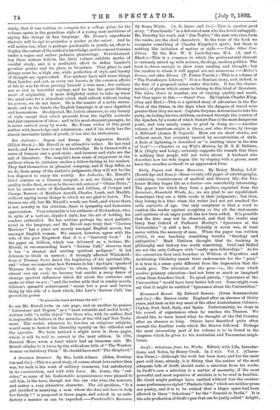Ides Judicatw : Papers and Essays. By Augustine Birrell. (Elliot
Stock.)—Mr. Birrell is an attractive writer. He has read much, and knows how to use his knowledge. He is blessed with a sense of humour and a good style; and humour and style are the salt of literature. The essayist's keen sense of enjoyment in the authors whom he criticises excites a fellow-feeling in his readers. They find themselves in pleasant company, and if they differ, as we do, from many of the author's judgments, they will not be the less disposed to enjoy his society. Res Judicatw, Mr. Birrell's third venture as a literary essayist, is not, we think, equal in quality to the first, or even to the second, series of " Obiter Dicta ;" but he cannot write of Richardson and Gibbon, of Cowper and George Borrow, of Matthew Arnold, Charles Lamb, and Hazlitt, without saying many things to which we are glad to listen. The themes are old, but Mr. Birrell's words are fresh, and where there is not novelty in his criticism, there is sympathy and humorous appreciation. Very admirable is his estimate of Richardson, who, in spite of a verbose, slipshod style, has the art of holding his readers enthralled. He has written perhaps the most pathetic novel in the language, and Mr. Birrell says truly that "Clarissa Harlowe " has a place not merely amongst English novels, but amongst English women. We cannot, however, agree with the wife of the poet Klopstock that it is a "heavenly book." In the paper on Gibbon, which was delivered as a lecture, Mr. Birrell, in recommending Law's "Serious Call," observes that it has "a strange and moving spiritual pedigree." It led Johnson to think in earnest ; it strongly affected Whitefield ; from it Thomas Scott dated the beginning of his spiritual life; and "when we remember how Newman in his ' Apologia ' speaks of Thomas Scott as the writer ` to whom, humanly speaking, I almost owe my soul,' we become lost amidst a mazy dance of strange spectral influences which flit about the centuries and make us what we are ; " and the writer adds that in sundry moods, Gibbon's splendid achievement "seems but a poor and barren thing by the side of a book which, like Law's 'Serious Call,' has proved its power
'To pierce the heart and tame the will.' " So can Mr. Birrell write on one page, and on another he praises "Literature and Dogma" as a "most valuable and useful book," written with "a noble object" for those who, with its author, find it impossible to believe in the miracles of the Old and New Testa- ment. The writer, whenever he touches on religious subjects, would seem to bestow his liberality equally on the orthodox and the agnostic. We have noticed a slight error in these pages, which it will be well to correct in the next edition. In 1791, Hannah More wrote a tract which had an immense sale. Mr. Birrell alludes to it twice by the ridiculous title of "The Washer- woman on Salisbury Plain." He should have said " The Shepherd."


















































 Previous page
Previous page